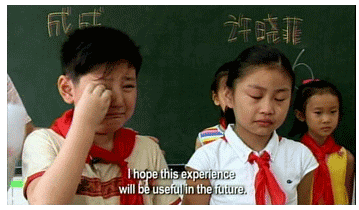Possibility of Democracy in China
Please Vote for Me made in 2007 by Weijun Chen was an attempt to summarize the broader predicament of a nation in a microscopic form by capturing the experimentation on exercising democracy conducted in a primary school of Wuhan in Central China. The film based on a small experiment eventually becomes an experiment in itself that finally evolves in the making of a statement. The film engages in resolving two vital issues whether China will become a democracy or ruled by the Communist Party? If at all there is democracy in China, how would the model really reflect like and will that be a better alternative?  Also the director explores the unwavering question whether democracy has a universal value fitting to the human nature.
Also the director explores the unwavering question whether democracy has a universal value fitting to the human nature.
Please Vote for Me initiates its journey with the proposal of ‘democratic election of the class monitor’ that will take place in a Grade 3 class of the school which was something new happening there. Three kids were nominated and they were Luo Lei (the previous monitor) Chen Chang and Xu Xiaofei and the entire class will exercise their voting right to elect anyone of them as the class monitor. The entire process of this ‘democratic election’ will comprise of campaigning of their talents and real potential to prove the eligibility for taking the position of the lead. Thus the transparency to be maintained for exercising democracy is theoretically established right within the first ten minutes at the onset of the film. But gradually the film unfolds the subtle reality that the process of voting even at the level of selecting a class monitor in a Grade 3 class is fed by temptations and manipulations at every stage. The fair decision through the exercise of the democratic right to vote is evaluated throughout the film hinting towards a conclusion that the process at the practical level is quite intoxicated. The purpose of Weijun Chen's experiment through the film Please Vote for Me is to portray the bigger society through a primary school of a small town, its children and its families that represents the urban middle class population of present China.
As the content of the film was so much enticing in the process of the experiment, similar was the evolving of the cinematic language that took a subjective journey to reach its objectivity. In getting the experiment done, many things are enacted simultaneously with the natural revelation of the events being captured. Weijun Chen takes the audience through a journey where the camera peeps into both the private and public space of these three kids and unveils their growing up into eligible candidates to seek votes.  The three kids comes from different backgrounds that indicate about the social and psychological built-up of these children and largely demonstrates the section of the society that would intend for a democratic nation and make it probable to really take place in the long run. And this 'democratic election' also becomes the struggle to win with any sort of means by hook or by crook. This nearly an hour film takes the audience in and involves them in this political process, thereby exercising power and making decisions. As a result it is evoked that democracy has certain level of corruption inherent to the structure of the political gamble that even the tender children cannot escape. This is exactly where it becomes a mirror reflection of your very own position in the system.
The three kids comes from different backgrounds that indicate about the social and psychological built-up of these children and largely demonstrates the section of the society that would intend for a democratic nation and make it probable to really take place in the long run. And this 'democratic election' also becomes the struggle to win with any sort of means by hook or by crook. This nearly an hour film takes the audience in and involves them in this political process, thereby exercising power and making decisions. As a result it is evoked that democracy has certain level of corruption inherent to the structure of the political gamble that even the tender children cannot escape. This is exactly where it becomes a mirror reflection of your very own position in the system.
Thus Please Vote for Me does not simply become a critical comment on the proposal that how would China be if it becomes a democratic nation but in a deeper sense, Please Vote for Me underlined the statement of democracy's inherent vulnerable nature and deceitful probabilities.






